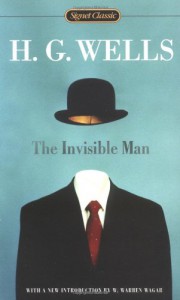6
Followers
24
Following
So.... Nicky?
Pretty much all books, history, science, civil rights, anime, travel, or, you know, baby animals.
The Invisible Man
 Much more entertaining than I expected; I must read more HG Wells! This one is well-constructed and scary and thoughtful, but for me it had a bit of a tone problem.
Much more entertaining than I expected; I must read more HG Wells! This one is well-constructed and scary and thoughtful, but for me it had a bit of a tone problem.I loved the first third, when he is incognito at the "Coach and Horses" in bucolic Iping. We see into everyone's thoughts but his, and the arch narration is both caustic and empathetic.
It was inevitable that a person of so remarkable an appearance and bearing should form a frequent topic in such a village as Iping. Opinion was greatly divided about his occupation. Mrs. Hall was sensitive on the point. When questioned, she explained very carefully that he was an "experimental investigator," going gingerly over the syllables as one who dreads pitfalls. When asked what an experimental investigator was, she would say with a touch of superiority that most educated people knew such things as that, and would thus explain that he "discovered things." Her visitor had had an accident, she said, which temporarily discoloured his face and hands, and being of a sensitive disposition, he was averse to any public notice of the fact.
Out of her hearing there was a view largely entertained that he was a criminal trying to escape from justice by wrapping himself up so as to conceal himself altogether from the eye of the police. This idea sprang from the brain of Mr. Teddy Henfrey. No crime of any magnitude dating from the middle or end of February was known to have occurred. Elaborated in the imagination of Mr. Gould, the probationary assistant in the National School, this theory took the form that the stranger was an Anarchist in disguise, preparing explosives, and he resolved to undertake such detective operations as his time permitted. These consisted for the most part in looking very hard at the stranger whenever they met, or in asking people who had never seen the stranger, leading questions about him. But he detected nothing.
Another school of opinion followed Mr. Fearenside, and either accepted the piebald view or some modification of it; as, for instance, Silas Durgan, who was heard to assert that "if he chooses to show enself at fairs he'd make his fortune in no time," and being a bit of a theologian, compared the stranger to the man with the one talent. Yet another view explained the entire matter by regarding the stranger as a harmless lunatic. That had the advantage of accounting for everything straight away.
Between these main groups there were waverers and compromisers. Sussex folk have few superstitions, and it was only after the events of early April that the thought of the supernatural was first whispered in the village. Even then it was only credited among the women folk.
But whatever they thought of him, people in Iping, on the whole, agreed in disliking him. His irritability, though it might have been comprehensible to an urban brain-worker, was an amazing thing to these quiet Sussex villagers. The frantic gesticulations they surprised now and then, the headlong pace after nightfall that swept him upon them round quiet corners, the inhuman bludgeoning of all tentative advances of curiosity, the taste for twilight that led to the closing of doors, the pulling down of blinds, the extinction of candles and lamps—who could agree with such goings on? They drew aside as he passed down the village, and when he had gone by, young humourists would up with coat-collars and down with hat-brims, and go pacing nervously after him in imitation of his occult bearing. There was a song popular at that time called "The Bogey Man". Miss Statchell sang it at the schoolroom concert (in aid of the church lamps), and thereafter whenever one or two of the villagers were gathered together and the stranger appeared, a bar or so of this tune, more or less sharp or flat, was whistled in the midst of them. Also belated little children would call "Bogey Man!" after him, and make off tremulously elated.
Their reactions to furniture that seems to move on its own and the plethora of other unexpected events is quite fun.
But after Our Man is on the run, the tone wobbles, and by the time he reaches Burdock and the house of Dr. Kemp, the story he tells is so horrid that the light tone feels too frothy. This dude has done some bad stuff, he's gone way off the tracks, and it's partly in reaction to his own treatment by society. Are we readers to laugh now or to seriously think about how we treat people who aren't like us?
[Griffin, the invisible man]: "We have to consider all that invisibility means, all that it does not mean. It means little advantage for eavesdropping and so forth -- one makes sounds. It's of little help -- a little help perhaps -- in housebreaking and so forth. Once you've caught me you could easily imprison me. But on the other hand I am hard to catch. This invisibility, in fact, is only good in two cases: It's useful in getting away, it's useful in approaching. It's particularly useful, therefore, in killing."
As usual, the ending throws the question back at us. This story is clever, thought-provoking, and has some read-out-loud-to-the-room funny bits.


